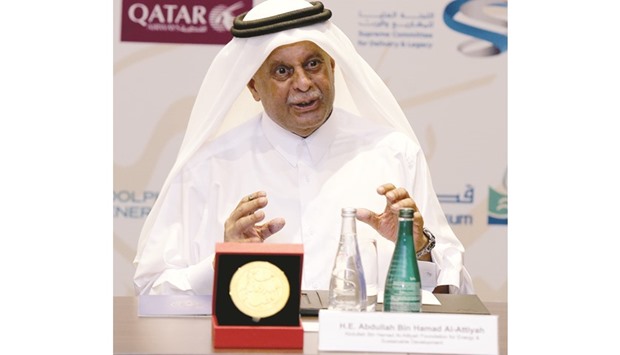The surge in the global supply of shale oil has curbed Opec’s ability to balance crude markets, Qatar’s Former Deputy Premier and Minister of Energy and Industry HE Abdullah bin Hamad al-Attiyah has said.
The Organisation of Petroleum Exporting Countries was able to balance the market in the past because output from shale oil deposits in the US and other non-Opec nations was insignificant, al-Attiyah told reporters at an industry event in Doha.
“Opec can’t act as swing producer because it will lose market share,” he said on Wednesday, referring to the group’s traditional practice of varying output to manage crude prices. Al-Attiyah was Energy Minister of Qatar, an Opec member, from 1992 to 2011.
Crude prices tumbled more than 75% from their 2014 peak due to a global glut fed partly by production at shale deposits in the US. Opec, which pumps about 40% of the world’s oil, meets in Vienna on June 2 to assess its output policy. The group is unlikely to set a production target as it sticks with Saudi Arabia’s strategy of squeezing out rivals such as higher-cost shale drillers, according to all but one of 27 analysts surveyed by Bloomberg.
“Frankly, I don’t expect anything from the next Opec meeting because, rightly, Opec decided not to play against the market,” Claude Mandil, a former executive director of the International Energy Agency, said at the same event. “Market forces are too strong now, and you can’t play against those forces when they are strong.”
Crude has surged more than 80% from a 12-year low earlier this year on signs the global oversupply will ease amid declining output in Nigeria and non-Opec countries including the US.
“The issue now for Opec members is how to diversify your economy from oil and gas,” Mandil told reporters in the Qatari capital. Mandil headed the IEA, a watchdog agency for the world’s most industrialised countries, from 2003 to 2007.
Al-Attiyah estimated current global inventories at about 5bn barrels of oil, including crude in floating storage, and said the market is oversupplied by about 1.5mn bpd.
“Just to cut production by 1.5mn bpd and the next day the price goes up and the other producers will take the whole share - there is no benefit for Opec in that,” he said. High oil prices in recent years were an incentive for many high-cost fields to be tapped, al-Attiyah said. If shale oil companies were to collapse due to financial strain imposed by low prices, this might cause another crisis like the one in 2007 and 2008, as many of them owe large debts to banks, he said.
“Opec can’t go out and fight on behalf of others,” he said. “You have one market. You don’t have an Opec market and a non-Opec market.”

HE al-Attiyah: Opec can’t go out and fight on behalf of others.
